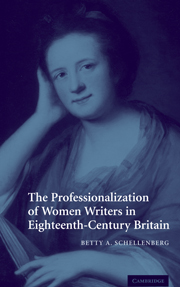Book contents
- Frontmatter
- Contents
- Acknowledgments
- A note on citations
- Introduction: “building on public approbation”
- 1 Frances Sheridan, John Home, and public virtue
- 2 The politicized pastoral of Frances Brooke
- 3 Sarah Scott, historian, in the republic of letters
- 4 The (female) literary careers of Sarah Fielding and Charlotte Lennox
- 5 Harmless mediocrity: Edward Kimber and the Minifie sisters
- 6 From propensity to profession in the early career of Frances Burney
- 7 Women writers and “the Great Forgetting”
- Coda
- Notes
- Bibliography
- Index
4 - The (female) literary careers of Sarah Fielding and Charlotte Lennox
Published online by Cambridge University Press: 12 November 2009
- Frontmatter
- Contents
- Acknowledgments
- A note on citations
- Introduction: “building on public approbation”
- 1 Frances Sheridan, John Home, and public virtue
- 2 The politicized pastoral of Frances Brooke
- 3 Sarah Scott, historian, in the republic of letters
- 4 The (female) literary careers of Sarah Fielding and Charlotte Lennox
- 5 Harmless mediocrity: Edward Kimber and the Minifie sisters
- 6 From propensity to profession in the early career of Frances Burney
- 7 Women writers and “the Great Forgetting”
- Coda
- Notes
- Bibliography
- Index
Summary
Sally [Fielding] has mended her style in her last Volume of D[avid] Simple, … The Art of Tormenting, the Female Quixote, and Sir C. Goodville are all sale work. I suppose they proceed from her pen, and heartily pity her, constrain'd by her Circumstances to seek her bread by a method I do not doubt she despises.
(Lady Mary Wortley Montagu to Lady Bute, 1754)[Mrs. Fielding] has really found great advantage from being of a sex which has a title to politeness from the other, for she has received the genteelest Letters accompanied with more substantial services from most of the scientificks & beaux Esprits of our Kingdom, those especially who are highest in reputation.
(Sarah Scott to Elizabeth Montagu, c. 1760)The fragmentary nature of Sarah Scott's literary reputation, both in her own time and now, despite her numerous, varied, and relatively well-received publications, invites the question of whether a literary career as we would recognize it was achievable for a woman writer at the height of the eighteenth century. But ahead of this gender-specific question stands the even more fundamental one of the relation of the “person of letters” to the literary professional, and the applicability of the term “career” to each. In his analysis of David Hume's career, Jerome Christensen insists that from its Renaissance origins, the term “man of letters,” though “generally honorific, … was never entirely free of the stigma of commerce, for the condition of possibility for the man of letters, and the basis for all his subsequent claims of independence, is the existence of the printing press and the publishing business.”
- Type
- Chapter
- Information
- Publisher: Cambridge University PressPrint publication year: 2005
- 1
- Cited by



